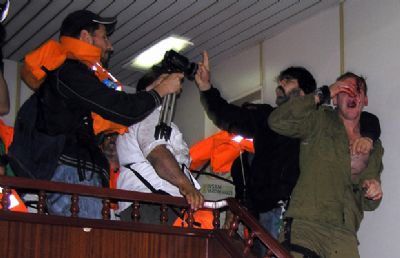"[J]udicial decisions should be dictated by law, not politics. The majority judges threw this principle out the window when they asserted that whether the alleged crime was sufficiently grave to merit ICC attention should depend not on what actually happened, but on the amount of 'attention and concern that these events attracted' from the international community, as reflected in 'several fact-finding efforts on behalf of States and the United Nations.' In other words, the ICC's choice of cases will depend not on their objective legal merits, but on how many resolutions the dictators who dominate the U.N. Human Rights Council decide to devote to it...
It means the court will spend its scarce resources investigating 10 people killed while attacking soldiers intercepting a blockade-busting flotilla, but ignore – to cite just one example – the tens of thousands of Syrian civilians killed by their own government's barrel bombs...
The second fundamental legal principle the decision guts is that the same person shouldn't be prosecutor, judge and jury. Since a prosecutor is obviously invested in his own case, he cannot be an impartial judge.
But the ICC judges, sitting as a 'pre-trial chamber,' decided to actively force the prosecutor to pursue an investigation she considered unjustified... Thus the court is no longer an impartial arbiter between prosecution and defense; it is now actively invested in the success of the case...
Finally, the court ignored the law itself. As [Judge] Kovacs also noted in his dissent, customary international law explicitly allows countries to enforce a lawful blockade, including by force if necessary. The blockade of Gaza is legal according to one of the very U.N. fact-finding committees the majority cited in its decision. And force was necessary in this case, since the ship refused repeated orders to halt and then attacked the Israeli boarding party with 'fists, knives, chains, wooden clubs, iron rods, and slingshots with metal and glass projectiles.' Thus the casualties 'were apparently incidental to lawful action taken in conjunction with protection of the blockade,' and as such, it's likely that 'most if not all of those acts will not qualify as war crimes.'
Yet the majority judges' opinion doesn't even mention the laws of blockade much less discuss their application to this case. Evidently, they consider customary international law irrelevant to their decisions..."
July 20, 2015
The ICC Mavi Marmara Decision: How to Gut the Principles of Law in One Easy Verdict

An injured Israeli commando (R) struggling with pro-Palestinian activists on the Gaza-bound Turkish ship Mavi Marmara (IHH/Adem Ozkose, Reuters)
Date
July 20, 2015
Title
How to Gut the Principles of Law in One Easy Verdict, Commentary Magazine
Author(s)
Evelyn Gordon
Original Source
